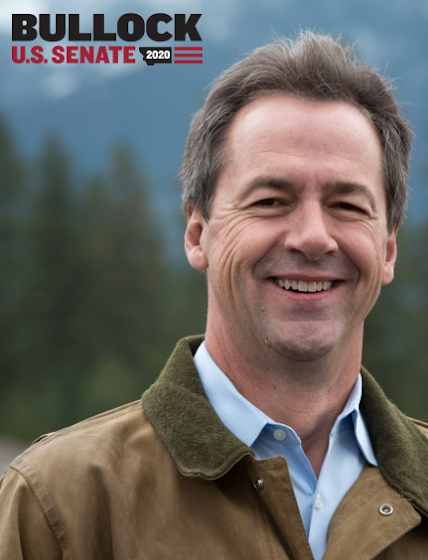Cook: Trump Is Dragging Down Republican Candidates With Him
She doesn't understand the difference between a Blue wave and an anti-red wave. There's no enthusiasm for Biden or the crappy party he "leads." All the enthusiasm is for stuffing Trump down a toilet and flushing. But the Beltway insiders will never understand that and will continue babbling like chimps about "a Blue wave." Fine, who cares; it ends up with the same results anyway.
Cook changed some of their electoral college predictions "to reflect this reality." All have moved towards the Democrats and all are laughably behind reality. Their best predictions are always the day after the election anyway. They move Wisconsin, Pennsylvania, and Nebraska’s 2nd district from toss up to lean Democrat. And Maine, which for whatever insane reason, was in the lean Democrat column moved to likely Democrat. Cook is so funny. They also moved Maine's 2nd district from likely Republican to just lean Republican. And she wrote that "Georgia has joined Arizona, North Carolina and Florida in the Toss Up column, although, at this point, Biden would be slightly favored to win at least Arizona and Florida."
Even Republican strategists she spoke with understand that Trump has now reached "a permanent loss of trust and faith of the majority of voters. In talking with strategists on both sides this last week, it’s also clear that Trump is dragging Republican congressional candidates with him as well. Plugged in strategists on both sides tell us that Trump is running behind in districts he easily carried in 2016. As one GOP strategist told us this week, 'I’d be surprised if any House GOP challenger is able to outperform Trump-- they are tied to him.' Meanwhile, Democratic Senate candidates-- even those in second and third-tier races-- are pulling in eye-popping second-quarter fundraising totals."
I spoke to a handful of candidates running strong in prohibitively red districts. Iowa progressive, J.D. Scholten, pointed out that his right-wing Trumpist opponent, Randy Feenstra "ran his primary campaign on the theme that he's best positioned to 'deliver' for Trump. But Trump's policies have systematically ravaged Iowa's farmers and rural communities in everything from the disastrous trade war to abuses of the Renewable Fuel Standard to corporate bailouts. Iowans don't need nor want another career politician who's beholden to corporate interests and afraid to stand up to power. We understand why folks voted for Trump-- they were looking for change and solutions, but unfortunately, that's not what we got. Our campaign is gaining traction with Trump voters, Republicans, and voters across the political spectrum because we're fighting for them: farmers, workers, and rural communities."
 Georgia progressive Lisa Ring told me that through her experiences she's concluded that the most dangerous thing we can do is assume we can predict political outcomes. "Every action," she said, "has the potential of harming or propelling a campaign but the ever-changing nature of politics renders an important development, insignificant within hours. In general, the failures of the Trump administration should be harmful to every legislator or candidate who remains loyal to it. However, it is what Democrats choose to do with the failings of the GOP that will make a difference. Or not.
Georgia progressive Lisa Ring told me that through her experiences she's concluded that the most dangerous thing we can do is assume we can predict political outcomes. "Every action," she said, "has the potential of harming or propelling a campaign but the ever-changing nature of politics renders an important development, insignificant within hours. In general, the failures of the Trump administration should be harmful to every legislator or candidate who remains loyal to it. However, it is what Democrats choose to do with the failings of the GOP that will make a difference. Or not."Simply pointing out that Rep. Buddy Carter is a Trump lackey who has followed his every direction in order to gain Trump’s official endorsement, is not enough," she continued. "Instead, I must remind the people of my district that Carter and Trump worked hand in hand to destroy the middle class, working class, and disadvantaged, by taking away whatever healthcare they had, letting small businesses fail, allowing our infrastructure to crumble, protections to be rolled back, and failing the millions of unemployed, as well as the millions of infected Americans who were provided no assistance and no leadership during a pandemic that is not even close to being over. 2016 and beyond, should have taught us not to rely on polls or predictors, but rather to continue to focus on the issues, and reach voters one on one. These times are unprecedented and we cannot sit back and analyze with numbers, beliefs that defy all reason. Instead let us hit the streets(virtually, if it must be) and connect truthfully to people who need answers and solutions to the very real problems they face daily."
Texan Julie Oliver shared something that has changed in a pretty big way since the 2018 campaign. "What we’ve seen over the last two election cycles is a growing number of 'independent' voters in TX-25. Some folks share that they’re former Republicans who have lost their party and will never vote for another Trumpublican, like Rep. Roger Williams, again. Sometimes we encounter these newly independent voters when we are phone-banking, or in the pre-pandemic world when we were able to canvass, but what we are seeing in this election cycle that really didn’t happen in the midterms is that many former Republicans reach out to our campaign unsolicited."
Yesterday, Astead Herndon wrote specifically about the Trumpist base in Georgia and Arizona being nonplussed about the GOP establishment Senate candidates. "Many Republican candidates face a perplexing electoral landscape this year, given that Mr. Trump’s conduct has endeared him to the party’s most conservative groups, but has soured some suburban moderates and seniors who are vital parts of any swing state coalition. These candidates are walking a tightrope, made more difficult by a voter base that doesn’t just want to elect Republicans, but rather loyal foot soldiers who take on Mr. Trump’s political and cultural enemies. It is the long-term political war over how Trumpism is best expressed-- not the short-term battle over Mr. Trump himself-- and how a party that has been driven by early-morning tweets for four years will seek to survive the next 40."
In the run-up to the 2018 midterm elections, a record number of House Republicans chose not to seek re-election rather than face conflict with the conservative base, and even a favorable Senate map saw Republicans lose in states like Arizona and Nevada.
With Mr. Trump on the ballot this year, it will be even harder for candidates to paper over the differences, and the uneasy relationship between the party’s most right-wing voters and the statewide Republicans like Ms. Loeffler and Ms. McSally who rely on their votes is bursting into the open.
Governors in both Arizona and Georgia are currently confronting this political challenge, after opening up their states’s economies at the urging of the president and those in the media who support him, only to face pressure to reverse course after coronavirus cases surged.
Polling also shows that Ms. Loeffler and Ms. McSally are underdogs in their respective races, facing an energized Democratic electorate in addition to their inner-party wrangling.
...A recent survey of Arizona voters from the New York Times and Siena College found Ms. McSally trailing her Democratic opponent, the former astronaut and U.S. Navy Captain Mark Kelly, by nine percentage points.
In a recent Fox News poll of the Arizona race, just 73 percent of Republicans supported Ms. McSally, while 88 percent of Democrats supported Mr. Kelly.
“They don’t buy her as a bona fide very conservative Republican,” said Chuck Coughlin, a longtime Republican political consultant in Arizona.
The candidates’ struggles speak to how real divisions among Republicans have been obscured by Mr. Trump’s victory in 2016, and could erupt again should he lose in November.
...Several Republicans in Arizona and Georgia said in interviews that the problem is not with Ms. Loeffler’s or Ms. McSally’s messages, but whether the base is buying the candidates as authentic. As a sign of their shared troubles among Republicans, some of the most negative publicity for both senators in the past year has come courtesy of Fox News, the cable outlet that is often sympathetic to the president.
...“The electorate has changed a lot,” Mr. Coughlin said, adding that the current Republican Party has “moved away from that narrative that people were originally attracted to. And in my view, has become one that’s reactive to the identity politics of the left.”
Labels: 2020 congressional elections, 2020 presidential election, Amy Walter, anti-red wave, Arizona, blue wave, Cook Report, J.D. Scholten, Julie Oliver, Lisa Ring, Republican civil war, tsunami



















